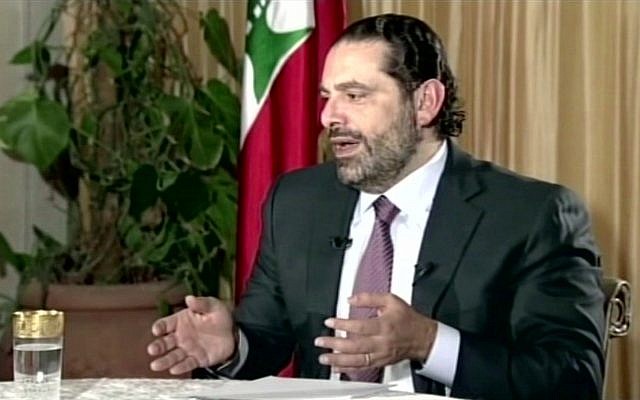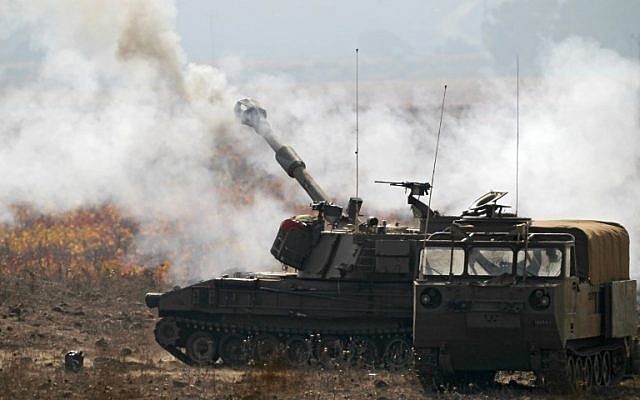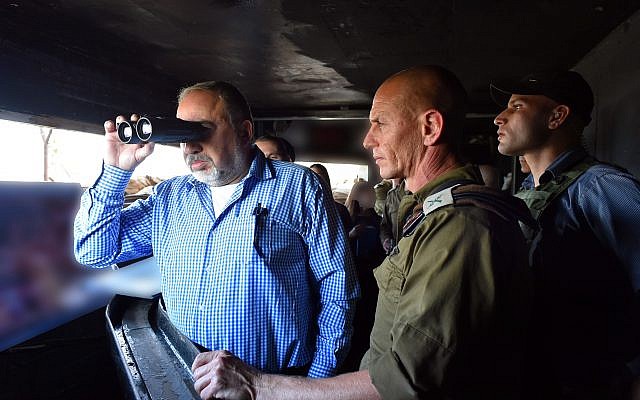In the crazy world of Middle East wars, politics and shifting alliances, it is hardly surprising that relations between Israel and Saudi Arabia are warming up from their deep freeze. In fact this is an alliance (“friendship” is too strong a word to use) that has been revving in the background for quite some time, ever since the rise of ISIS and more importantly, the tailwind given to Iran by our “friends” in the Obama administration and their European allies through the JCPOA, aka the Iran nuclear deal.
In the interim there has been some political upheaval in the kingdom, with princes and heirs to the throne being replaced at an eye-watering pace. The newest heir to the throne is determined to drag the medieval country into the 21st century, by whatever means:
(CNN)Saudi Arabia’s Prince Mohammed bin Salman, first in line to inherit the throne from his 81-year-old father, is not a patient man. The 32-year-old is driving a frenetic pace of change in pursuit of three goals: securing his hold on power, transforming Saudi Arabia into a very different country, and pushing back against Iran.
In the two years since his father ascended the throne, this favorite son of King Salman bin Abdulaziz has been spectacularly successful at achieving the first item on his agenda. He has become so powerful so fast that observers can hardly believe how brazenly he is dismantling the old sedate system of family consensus, shared privilege and rigid ultraconservatism.In the process, however, MBS, as the crown prince is known, is making a lot of enemies.…Much of the prince’s agenda is laudable and long overdue. He has no interest in democratic reforms, but he does want to introduce social reforms, and is making some progress on that front. That, too, is making him enemies among the old guard.He has vowed to improve the status of women, announcing that the ban on women driving will be lifted next year, and limiting the scope of the execrable “guardianship” system, which treats women like children, requiring permission from male guardians for basic activities. He has also restrained the despised religious police. And just last month he called for a return to a “moderate Islam open to the world and all religions,” combating extremism and empowering its citizens.On the economic front, bin Salman wants to reinvent an economy that became complacent from fantastic oil riches — only to see oil prices crash — and bring it into the 21st century with his ambitious Vision 2030 plan.But the prince’s revolutionary changes require, above all, making sure he remains in charge, and he is letting nothing stand in his way.The prince is not bluffing. That became startlingly clear last Sunday, when he unexpectedly ordered the arrest of some of Saudi Arabia’s most powerful men.
Read it all, it makes for a thrilling read, even though this is not fiction but real life with very real and dangerous potential consequences if it fails.
Meanwhile, the latest pronouncements and actions emanating from Saudi Arabia give us pause for a cautious hope, though with each country having an influence on the next, there is always the danger of a domino effect, or maybe we should call it the dangers of unforeseen consequences.
The Saudis called on Hezbollah to disarm, threatening to oust it from Lebanon:
Saudi Arabian Foreign Minister Adel al-Jubeir on Thursday called on the Hezbollah terrorist organization to disarm, warning the group that regional efforts were underway to oust them from the Lebanese government.
At a press conference in the Saudi capital of Riyadh, al-Jubeir denounced Hezbollah as “a tool of the Iranian Revolutionary Guards” and “a first-class terrorist organization used by Iran to destabilize Lebanon and the region.”
“Hezbollah has kidnapped the Lebanese system,” he said.
Al-Jubeir added that “consultations and coordination between peace-loving countries and Lebanon-loving countries are underway to try to find a way that would restore sovereignty to Lebanon and reduce the negative action which Hezbollah is conducting in Lebanon.”
The minister’s remarks came as the kingdom rejected accusations that Lebanese Prime Minister Saad Hariri was being detained in Riyadh following his shock resignation earlier this month.
In response Hezbollah raised the alert across Lebanon, which further complicates matters for Israel:
The Hezbollah terror group has raised its alert status across Lebanon, fearing threat of attack by Israel and other nations, Kuwaiti newspaper Al Rai reported Saturday.
The news came amid a political crisis between Beirut and Saudi Arabia, sparked by Lebanese Prime Minister Saad Hariri’s surprise resignation. Hariri cited Iran and Hezbollah’s meddling in the region as the reason he was stepping down. The November 4 resignation broadcast from the Saudi capital is widely believed to have been engineered by the Gulf kingdom.
…
The Kuwaiti paper further reported that Hezbollah leaders have instructed a halt to arms shipments sent to the group from Iran through war-torn Syria.
Israel is widely believed to have carried out airstrikes on advanced weapons systems in Syria — including Russian-made anti-aircraft missiles and Iranian-made missiles — as well as Hezbollah positions, though it rarely officially confirms such attacks.
In August a former air force chief said Israel carried out dozens of airstrikes on weapons convoys destined for the Lebanese terror group over the past five years.
Al-Jubeir warned Friday that there will be no stability in Lebanon unless Hezbollah disarms.
The resignation of Saudi-aligned Hariri has thrown Lebanon into turmoil and raised concerns that the country could be dragged into a battle for regional supremacy between Saudi Arabia and Iran.
Indeed Israel has been watching Syria’s actions carefully and taking defensive action where necessary. On Sunday the IDF fired on Syrian targets fortifying positions near the demilitarized zone Golan heights:
The IDF fired upon Syrian army positions Sunday evening near the Israeli border in the Golan Heights on Sunday, the IDF spokesperson’s office reported.
Syrian forces had been working to fortify a military outpost in the buffer zone, in violation of ceasefire agreements, and an IDF tank fired deterring shots in response.
A similar incident occurred on Saturday, when an IDF tank fired a warning shell near Syrian forces after identifying a Syrian army-built outpost in the demilitarized zone between Syria and Israel, similarly contrary to ceasefire agreements.
According to the IDF, the outpost was located close to the Druse village of Hader on the Syrian-controlled side of the Golan Heights.
Earlier this month, following intense fighting in the village, the IDF said it was willing to provide assistance and prevent the capture of the Druse village by anti-regime forces.
Meanwhile Israel is continuing its humanitarian assistance to Syrian refugees. For the first time ever, the IDF permitted Israeli TV Channel 2 News to film the crossing of some refugees, and one Syrian mother of a sick child said “All Syrians want to come to Israel” – a mind-boggling statement considering that Israel and Syria have been deadly enemies since Israel’s establishment and even before:
Extraordinary footage showing Syrian mothers crossing into Israel with their sick children for medical care was broadcast by Israel’s Hadashot news (formerly Channel 2) on Sunday after the Israel Defense Force (IDF) permitted the channel to film for the first time operations part of its ongoing policy of providing care for civilians and select combatants injured in the country’s raging civil war.
In interviews accompanying the footage, several Syrian mothers expressed deep gratitude to Israel for providing medical assistance and said that many Syrians living near the border no longer view Israel as the enemy, while another said that “all Syrians” would come to Israel if given the opportunity.
“Israel was thought of as the enemy… Now that you are helping us, most [on the Syrian side of the Golan Heights] are with you. They love Israel. They see the true face… the reality,” one mother said.
Another added that the real enemies are “Islamic State, Hezbollah, Bashar [Assad]. They’re all the same.”
“I wish we could stay here for good,” another interviewee told the reporter. “I’d be the first to cross [if the border were open]” she said, adding that “all of Syria would follow me. All the civilians left in Syria would come.”
Read their heart-breaking stories of abuse, murder, executions and more at the hands of the various Syrian factions and the regime.
Watch the video below:
With this in mind, Israeli Defence Minister Avigdor Liberman called on the Arab nations to make peace with Israel and confront Iran:
“After Daesh, Iran,” Liberman tweeted on Saturday, referring to the Islamic State by its Arabic name. “[Late Egyptian President] Anwar Sadat was a brave leader, who went against the stream and paved the way for other Arab leaders to recognize the importance of strategic ties with Israel.”
Defense Minister Avigdor Liberman looking through binoculars during a visit to the Israel’s northern border, November 14, 2017. Ariel Hermoni/Ministry of Defense)
“40 years after his historic visit to Israel, I call on leaders in the region to follow the path of President Sadat, come to Jerusalem and open a new chapter, not just in terms of Israel’s relations with the Arab world, but for the whole region,” Liberman wrote.
Sadat famously flew to Jerusalem ahead of signing the Camp David peace deal with Israel, the first Arab leader to do so. Sadat was later assassinated for his actions.
“The Middle East today needs, more than anything else, a coalition of moderate states against Iran. The coalition against Daesh has finished its work, after Daesh, Iran,” Liberman wrote in remarks that appeared to be directed in part at Saudi Arabia.
Saudi Arabia has in recent days stepped up its efforts to counteract Iran and its proxies in Yemen, and the Hezbollah terror group in Lebanon.
All these shifting alliances hold great potential benefit for Israel, especially Saudi Arabia’s turnabout, but Melanie Phillips wonders if it is all too good to be true:
According to the Turkish Anadolu news agency, reported here, the Grand Mufti of Saudi Arabia, Abdul Aziz al Sheikh, has issued a quite remarkable religious ruling. Answering a question on TV about the Palestinian Arab riots over Temple Mount last July, he didn’t merely denounce Hamas as a “terror organisation”.
Much more significantly he actually issued a fatwa, or religious ruling, forbidding war against the Jews; and he said that fighting against Israel was inappropriate.
How can this be anything other than highly significant?
With a religious fatwa coming on the heels of a Saudi realignment as well as their internal political upheaval, it is probably good news – we will just have to be patient, to wait and see:
We can all obviously see the politics behind this. Saudi Arabia is in the fight of its life with Iran, to which end it has forged tacit and not-so-tacit alliances with Israel as well as the US. The new, reformist Crown Prince Mohammed bin Salman has not only supported this alliance with Israel but, more remarkably, has said that now is the time for the kingdom to get rid of Wahhabi extremism and revert to “what we followed – a moderate Islam open to the world and all religions”.
… the fact that the Prince made such a statement about now getting rid of extremism, in public, followed by this fatwa from the Grand Mufti, in public, surely suggests that the tectonic plates might just be beginning to shift within the heartland of Sunni fundamentalism.
Too good to be true? Just more smoke and mirrors? Of no more significance than a temporary alliance of expediency? Maybe. Nevertheless, a religious statement goes beyond politics. Neither the Prince nor the Grand Mufti needed to open up the religious issue in public at all. Watch this space, eh.
I’m sure the Israeli authorities are proceeding with caution. כבדהו וחשדהו is what they say in Hebrew: Literally: respect him and suspect him. Verify and justify.







Pingback: Israel and Saudi Arabia: a desert mirage or a new alliance? – 24/6 Magazine
why no FaceBook sharing link on this?
There is a FB share! You have had this problem before. Maybe it’s your browser settings.
Pingback: Israel and Saudi Arabia: a desert mirage or a new alliance? |
re the warming relationship between Israel and Saudis, this has been evident for some time, albeit at a lower level than now. The Saudis have long appreciated (even if they couldn’t say it out loud) that a stable Israel is very much in their interests, certainly compared with a “mad-dog” (from their point of view) Iran to the north. Indeed, I wrote about this in an article Anne was kind enough to post here a couple of years ago.
Before the Obama administration reached their “agreement” with the Ayatollahs, there was a real fear that Israel might well make a serious effort to put the Iranian nuclear programme out of action, much as they had done in 1981(?) in Iraq. There was serious speculation that the Saudis had let it be known that they would “fail to see” Israeli aircraft overflying Saudi Arabia on their way to taking out the Iranian nuclear threat to the region (much as the Azerbaijani authorities did at much the same time).
In the intervening period, most of the Gulf states have also warmed to Israel for the same reasons. When it comes to threats towards Sunni Islam from Shia Islam, the “Jewishness” of Israel fades into the background, largely because Israel has no territorial or religious ambitions towards the Moslem world.
In this regard, the fate of the “territories” fades into insignificance compared with the threat to Sunni Islam.
Its amazing what the threat of a powerful outside body can do to supposedly entrenched political and religious antipathies!
Indeed. Self-preservation seemingly trumps Mohammedan theological dogma:
hadith Bukhari: The Day of Judgement will not come about until Muslims fight the Jews, when the Jew will hide behind stones and trees. The stones and trees will say O Muslims, O Abdullah, there is a Jew behind me, come and kill him. Only the Gharkad tree would not do that because it is one of the trees of the Jews.
So… how to square the forecast of the Mohammedan prophet (above) with the Grand Mufti of Saudi Arabia, Abdul Aziz al Sheikh, issuing a fatwa forbidding war against the Jews; and he said that fighting against Israel was inappropriate (cite: Melanie Phillips article). That is, the KSA mufti is prepared to delay the “Day of Judgement” and deny Mohammedan orthodoxy (at least until the US and IL clean up the Iranian threat).
Interesting times, indeed…
I agree with both of you, Brian and Earl. The Sunni Arab states finally appear to have concluded that self-interest trumps (excuse the pun) any ideological aversion to Israel as an infidel state. Whether this welcome state of affairs will continue once Iran is neutralized (speedily in our days, Amen) is another matter altogether. I really hope that by that stage both the leaders and their people will have become accustomed to a non-satanic image o Israel. Normalization would be nice but I’d be satisfied with non-aggression and a cold peace a la Egypt.
What interest me more is the reaction of surprise by much of the world to this. The Saudi’s if nothing else, understand that nothing is more threatening then a unchecked Iranian presence, their brand of Islam is a direct challenge to Saudi rule, not to mention no radical likes another if they are spewing a message that is a challenge to theirs.
I think though the biggest surprise is the quickness of change one sees, but don’t put all your hopes in this man, the reality is what he is doing is going against what has been in power and entrenched for years in Saudi life, I worry about his safety, I am sure there are many whom wish to do him harm. But even if they do, I still see no way that Saudi would want to pull away from Israel, it simply would not be in their best interests, but under a difference guidance they would be far more secretive then they are now.
I think the world is surprised because people have become used to the situation as it has held for decades, ever since Israel’s founding. No one has been paying much attention to Israel-Saudi relations because there is no war, no land claims etc., and there are more urgent things to worry about. Until the rise of Iran…
I too hope this man stays safe, and also the other sheikhs and imams and journalists who have called for non-aggression at the least with Israel.
Commenting with hindsight, I don’t think that the publicity around this “new” dialog, and the bombing of a Mosque with over 200 dead is at all a coincidence. The Jew-Hatred that usually takes front and center on a global scale should not obscure the centuries-old often violent rifts in Islam.
There is no more appropriate reaction in my heart than grief for the people whose lives were ended or permanently scarred by this hateful violence. I feel it as profoundly as the loss of a single child’s life in a senseless drive-by shooting in my own city of Philadelphia, USA.
Regards,
Jeff *יןׄסֵֵף לֵ״ב **(Yosef Labe)*
Indeed the mosque bombing is horrific. You are right that the Jew-hatred obscures the huge rifts within Islam. In fact Jew-hatred is a useful tool by Muslim rulers to deflect domestic unrest and direct it outwards at the ‘outsider” – the Jews. But when the Jews aren’t involved, they turn on their own as they have done for centuries.
The bloodbaths they commit amongst themselves dwarf anything done by Israel and the West.